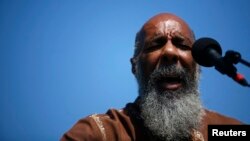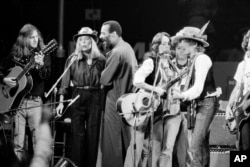Folk-rocker Richie Havens, who died Monday of a heart attack, will be remembered for many things, among them a smooth singing voice, standing six-and-a-half-feet tall, and singing at President Bill Clinton’s first inauguration. But the most famous of his many lauded concert appearances happened by accident.
Richie Havens’ performance at Woodstock in 1969 catapulted him into music history, but the lanky, soulful folk singer wasn’t supposed to open the festival - he was scheduled to play fifth that day. Plans changed when the opening band, Sweetwater, got caught in traffic. Havens and his band had traveled to the upstate New York festival site by helicopter, so they were ready to hit the stage when organizers asked Havens to go on instead.
In his book about the festival, producer Michael Lang said he chose Havens as his “emergency opener” “because of his calm but powerful demeanor”. His performance went overtime because the next act was stuck in traffic, too. This led Richie Havens to improvise what became one of the most iconic moments of the Woodstock Festival: his performance of “Freedom/Sometimes I Feel Like a Motherless Child.”
Havens later explained how he came up with his most famous song. He thought back to the start of the festival and hearing “freedom” over and over again in the crowd. Picking up the chant, Havens repeated the word, and then began singing an old gospel song that he’d learned as a child. The improvised medley was a highlight of the Woodstock movie and cemented Havens’ place in music history.
The oldest of nine children, Havens was raised in the poor Bedford-Stuyvesant section of Brooklyn, New York. As a child, he dreamed of growing up to be a surgeon, but set off on a musical path as a teenager. Forming a gospel group in high school, he then landed in New York’s Greenwich Village folk clubs at 17. He stood out from the other young singers, not just because of his height, but his ethnicity - Richie Havens was African-American in a largely white folk music scene.
He recorded two albums on small labels before signing with Bob Dylan’s manager, Albert Grossman. He then joined a larger label and went on to tour for more than 40 years, releasing close to 30 albums.
While he was a good songwriter, Richie Havens was also an exceptional song interpreter. In interviews and at shows he’d tell of spending three days learning Bob Dylan’s “A Hard Rain’s A-Gonna Fall,” repeatedly practicing the song in a stairwell. One night, a man stopped him and said it was the best version he’d ever heard. Havens always ended the story and started the song by saying: “that’s how I first met Bob Dylan.”
In 2008, Richie Havens released his final studio album, “Nobody Left To Crown.”
Havens died April 22 at the age of 72. He embodied the spirit of the 1960s and carried that message of peace and love well into the 21st century.
Richie Havens performs "Here Comes the Sun" for VOA, August 2009:
Richie Havens’ performance at Woodstock in 1969 catapulted him into music history, but the lanky, soulful folk singer wasn’t supposed to open the festival - he was scheduled to play fifth that day. Plans changed when the opening band, Sweetwater, got caught in traffic. Havens and his band had traveled to the upstate New York festival site by helicopter, so they were ready to hit the stage when organizers asked Havens to go on instead.
In his book about the festival, producer Michael Lang said he chose Havens as his “emergency opener” “because of his calm but powerful demeanor”. His performance went overtime because the next act was stuck in traffic, too. This led Richie Havens to improvise what became one of the most iconic moments of the Woodstock Festival: his performance of “Freedom/Sometimes I Feel Like a Motherless Child.”
Havens later explained how he came up with his most famous song. He thought back to the start of the festival and hearing “freedom” over and over again in the crowd. Picking up the chant, Havens repeated the word, and then began singing an old gospel song that he’d learned as a child. The improvised medley was a highlight of the Woodstock movie and cemented Havens’ place in music history.
The oldest of nine children, Havens was raised in the poor Bedford-Stuyvesant section of Brooklyn, New York. As a child, he dreamed of growing up to be a surgeon, but set off on a musical path as a teenager. Forming a gospel group in high school, he then landed in New York’s Greenwich Village folk clubs at 17. He stood out from the other young singers, not just because of his height, but his ethnicity - Richie Havens was African-American in a largely white folk music scene.
He recorded two albums on small labels before signing with Bob Dylan’s manager, Albert Grossman. He then joined a larger label and went on to tour for more than 40 years, releasing close to 30 albums.
While he was a good songwriter, Richie Havens was also an exceptional song interpreter. In interviews and at shows he’d tell of spending three days learning Bob Dylan’s “A Hard Rain’s A-Gonna Fall,” repeatedly practicing the song in a stairwell. One night, a man stopped him and said it was the best version he’d ever heard. Havens always ended the story and started the song by saying: “that’s how I first met Bob Dylan.”
In 2008, Richie Havens released his final studio album, “Nobody Left To Crown.”
Havens died April 22 at the age of 72. He embodied the spirit of the 1960s and carried that message of peace and love well into the 21st century.
Richie Havens performs "Here Comes the Sun" for VOA, August 2009:







